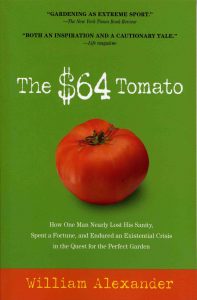The $64 Tomato by William Alexander
 I’ve been perusing seed catalogs for our four little vegetable beds. Despite our summer fog, our little garden gives us fresh lettuce, peas, greens and herbs most of the year. Once we get our first taste of our own garden salad made from heirloom lettuces and organic herbs, we decide it’s all worth it. Be damned the slugs, the mold from the fog, the time, effort and mostly the cost.
I’ve been perusing seed catalogs for our four little vegetable beds. Despite our summer fog, our little garden gives us fresh lettuce, peas, greens and herbs most of the year. Once we get our first taste of our own garden salad made from heirloom lettuces and organic herbs, we decide it’s all worth it. Be damned the slugs, the mold from the fog, the time, effort and mostly the cost.
So, with visions of fresh peas and lettuce dancing in my head, I picked up this slim little book, sitting on my shelf for years now. The $64 Tomato is for gardeners and wannabe gardeners alike — and the subtitle says it all:
How One Man Nearly Lost His Sanity, Spent a Fortune, and Endured an Existential Crisis in the Quest for the Perfect Garden
This is a unvarnished, honest look at what it means to maintain a garden when everything seems against you, and your dreams and plans vastly outrun the available time. But, like all hopeful gardeners, Mr. Alexander gamely plows ahead. (pun intended, couldn’t resist — I’m here all week, tip your waitress)
I laughed my way through this quirky memoir, reading about Mr. Alexander’s 2,000 sq. foot Hudson Valley vegetable garden, a fruit tree orchard and even his attempts to recreate a Swiss-style wildflower meadow on the property.
There’s a spooky handyman who bears a striking resemblance to Christopher Walken, a crew of exasperating contractors, and a menagerie of groundhogs, deer, Japanese beetles and crop destroying worms. These pests, both insect and mammal, defy Mr. Alexander at every turn. They come, they see his garden, and they conquer. His efforts to eradicate those pests (and yes, eradicate means exactly what you think) involve a mean 6,000-volt electric fence (really?) and harken back to that male-favorite film Caddyshack.
But throughout, we do see that Mr. Alexander does actually recognize the joy from his efforts:
Gardening is, by its very nature, an expression of the triumph of optimism over experience.
You gotta feel for this guy, there are the vacations that had to be planned around the harvest, the near electrocution of the tree man, the limitations of his middle-aged body, and the judgment of his wife and kids.
Mr. Alexander’s cost-benefit analysis included every cost — from seed ordered by the pound, to the live animal traps and then amortizing it over the entire life of his garden — results in a staggering $64* to grow each of his prized Brandywine tomatoes. (They sound wonderful, nothing like a homegrown tomato – but yes $64 seems extraordinary.)
But as any gardener will tell you, the pleasure of growing fresh food for friends and family — well that’s priceless.
*Another reviewer (obviously an economics major) pointed out that Mr. Alexander puts the entire costs of his garden on the poor tomato. This reviewer suggested he should have evaluated all crops at market value, taken that number and subtracted it from total expenditures, and then use the difference as a percentage of total expenditures to be applied as a markup percentage to the market value of the Brandywines equally with other crops.
In other words — don’t blame the tomato.
Mr. Alexander has also written several other books…all revealing his obsessive tendencies. I plan on reading both of these next:
52 Loaves in which our hero attempts to recreate a perfect loaf of bread from scratch: growing, harvesting, winnowing, threshing, and milling his own wheat, and
Flirting with French: How a Language Charmed Me, Seduced Me, and Nearly Broke My Heart. Mr. Alexander’s struggle to master a foreign language after age 50.
I like this guy, he’s my sort of geek, obsessive yet funny — outlandish, yet self depreciating. I would love to chat an afternoon away with him – preferably in the garden.
So, Mr. Alexander, if you’re reading this, you have an open invitation to stop by for a cup of coffee — or perhaps a salad — you can bring the tomatoes.





